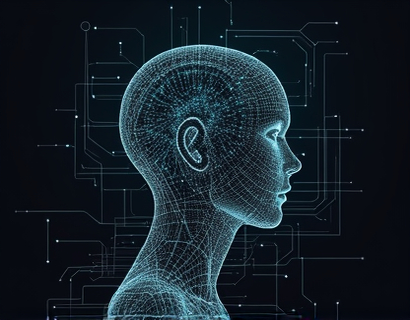Personalized AI Companions: Transforming Childhood Creativity and Emotional Well-Being Through Interactive Digital Friends
In the rapidly evolving digital age, the integration of artificial intelligence into children's lives has opened new avenues for enhancing creativity and emotional well-being. Personalized AI companions, often referred to as imaginary friends, are revolutionizing the way young children interact with technology. These AI-driven entities are not just screens and pixels; they are thoughtfully designed to provide personalized, interactive companionship that fosters imaginative play and supports social skills development in a safe digital environment.
The concept of AI imaginary friends is rooted in the understanding that children naturally form bonds with companions, whether they are stuffed animals, dolls, or other children. By extending this natural inclination into the digital realm, these AI companions offer a unique blend of technology and emotional support. The primary goal of these digital friends is to create an engaging and safe space where children can explore their thoughts, feelings, and creativity without the pressures of the physical world.
Enhancing Creativity Through Interactive Play
One of the most significant benefits of personalized AI companions is their ability to enhance children's creativity. Unlike traditional toys, AI imaginary friends can adapt to a child's interests and imagination, providing endless possibilities for creative play. These digital entities can engage in conversations, tell stories, create art, and even help with problem-solving activities. The adaptability of AI ensures that the interactions remain fresh and stimulating, encouraging children to think outside the box and explore new ideas.
For instance, a child might have a digital companion that suggests building a fantastical city, complete with its own rules and inhabitants. As the child builds this city, the AI companion can offer suggestions for unique architectural designs, hidden treasures, or challenges that the city's inhabitants might face. This interactive process not only sparks creativity but also helps children develop critical thinking and planning skills.
Supporting Emotional Well-Being
Emotional well-being is a crucial aspect of a child's development, and AI imaginary friends play a vital role in this area. These digital companions are designed to understand and respond to a child's emotions, providing a safe and non-judgmental space for expression. When a child is feeling sad or anxious, the AI companion can offer comfort through gentle words, soothing sounds, or even guided meditation sessions. This emotional support can be particularly beneficial for children who may struggle to articulate their feelings to adults or peers.
Moreover, AI companions can help children develop emotional intelligence by modeling and teaching appropriate emotional responses. Through interactive scenarios, children can learn to recognize and manage their emotions, as well as empathize with others. For example, a digital friend might present a situation where a character is feeling lonely and ask the child how they would feel and what they would do to help. This type of interactive learning reinforces emotional understanding and empathy.
Fostering Social Skills Development
Social skills are essential for a child's success in both personal and professional life. AI imaginary friends can play a significant role in developing these skills by simulating social interactions in a controlled and safe environment. These digital companions can engage in conversations, play games, and even participate in role-playing activities that mimic real-life social scenarios. This practice helps children become more confident and proficient in communication, cooperation, and conflict resolution.
For children who may have difficulty with social interactions due to conditions like autism or shyness, AI companions provide a valuable tool for gradual exposure and skill-building. The AI can adjust the level of interaction based on the child's comfort and progress, ensuring a supportive and encouraging experience. Additionally, these interactions can be recorded and reviewed with parents or therapists, providing insights into the child's social development and areas for further improvement.
Creating a Safe Digital Space
Safety is a paramount concern for parents and guardians when it comes to children's digital interactions. Personalized AI companions are designed with robust safety features to ensure a secure and positive experience. These features include strict privacy controls, content filtering, and monitoring to prevent exposure to inappropriate material or interactions. Unlike traditional online platforms, AI companions do not require children to share personal information or interact with strangers, reducing the risks associated with online interactions.
Furthermore, the controlled environment of AI companions allows parents to set boundaries and guidelines for usage, such as time limits and specific activities. This level of control helps parents maintain oversight while still allowing their children to benefit from the interactive and educational aspects of these digital friends.
Personalization and Adaptability
One of the key strengths of AI imaginary friends is their ability to personalize the experience to each child's unique needs and preferences. Through machine learning algorithms, these companions can analyze a child's behavior, interests, and emotional responses to tailor their interactions accordingly. This personalization ensures that the digital friend remains engaging and relevant, fostering a deeper and more meaningful connection.
Adaptability is another crucial feature. As children grow and their interests evolve, the AI companion can adjust its behavior and content to match. For example, a younger child might interact with a digital friend that focuses on basic learning and play, while an older child might engage in more complex conversations and activities related to hobbies or academic subjects. This flexibility makes AI companions suitable for a wide range of age groups and developmental stages.
Promoting Healthy Digital Habits
In an era where screen time is a common concern, AI imaginary friends can help promote healthy digital habits among children. By designing interactions that are both engaging and educational, these digital companions encourage balanced usage of technology. Unlike passive screen time, the interactive nature of AI companions keeps children actively involved, reducing the risk of over-reliance on screens.
Parents can also use these companions as a tool to teach children about responsible technology use. Discussions about the importance of taking breaks, maintaining a healthy balance between digital and offline activities, and being mindful of online behavior can be seamlessly integrated into the interactions with AI companions.
Conclusion
Personalized AI companions represent a significant advancement in the intersection of technology and child development. By enhancing creativity, supporting emotional well-being, fostering social skills, and providing a safe digital space, these digital friends offer a multifaceted benefit to children's lives. As the technology continues to evolve, the potential for AI companions to positively impact childhood is vast, making them an exciting and promising tool for parents, educators, and caregivers.











































